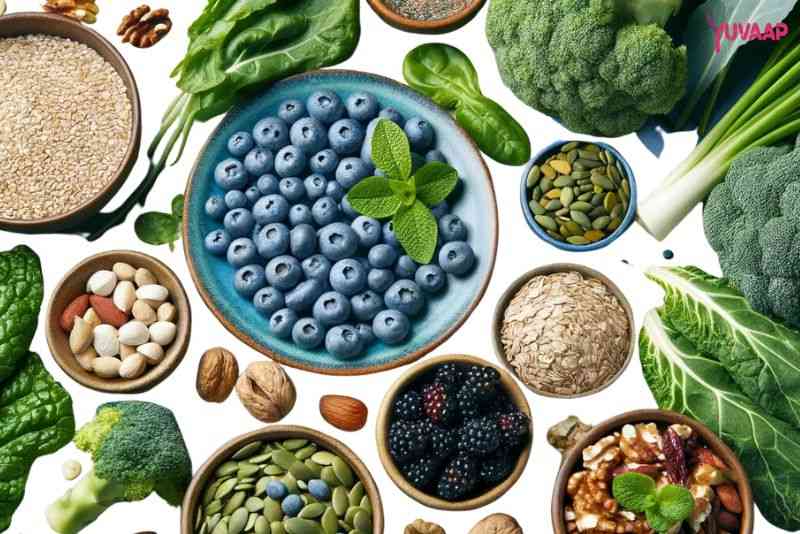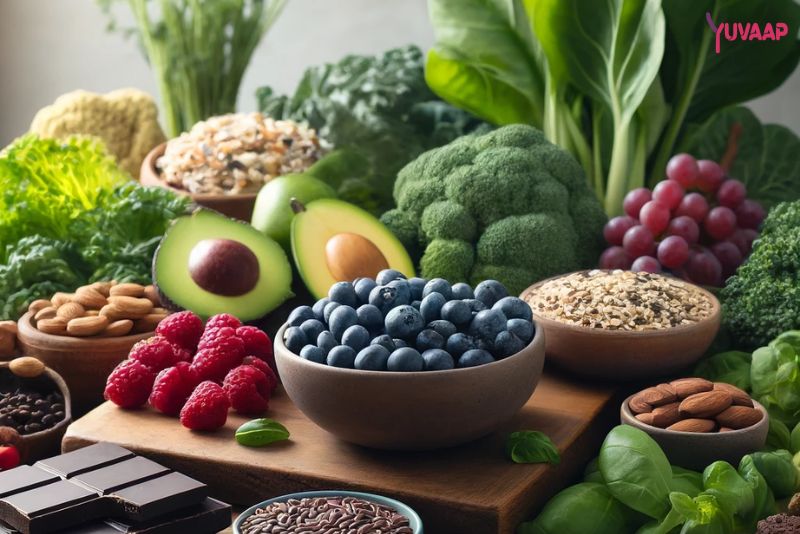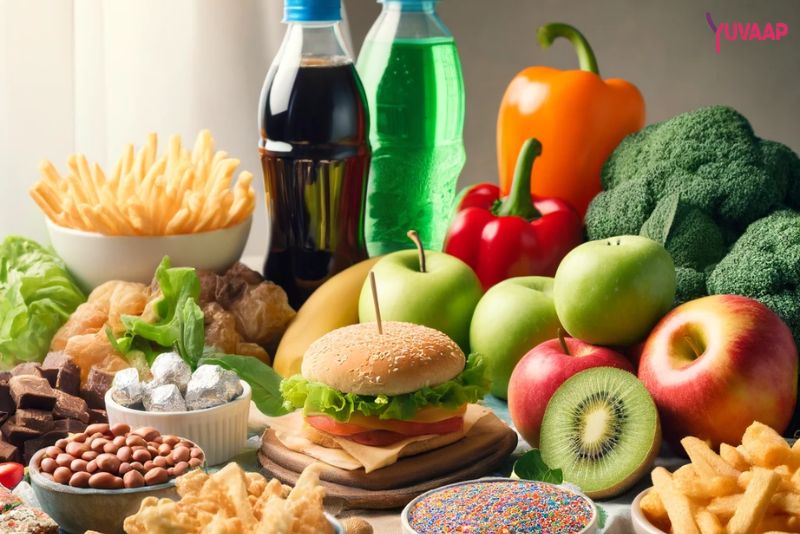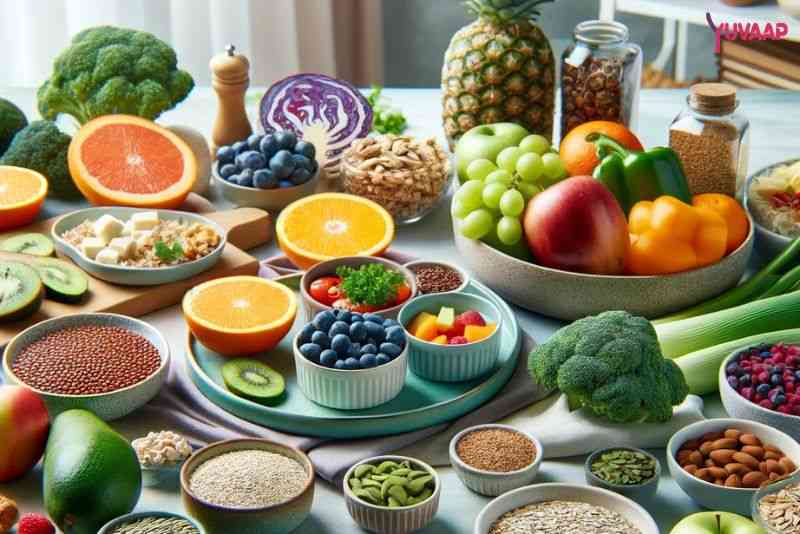Have you ever wondered how the food you eat affects how you feel? Just like your body needs the right fuel to stay healthy, your brain needs the right nutrients to function well. The connection between diet and mental health is a strong one. What you eat can make a big difference in how you feel emotionally and mentally.
Understanding how nutrition affects mental health is important because it can help you make better choices about what to eat. This blog will give you practical advice on how to improve your mental health through your diet. To further explore ways to improve your mental health, check out this blog on how to improve mental health in the workplace.
We will look at the types of foods that can help reduce stress, anxiety, and depression, and also talk about how to create a balanced diet that supports a healthy mind.
Your overall wellness is like a puzzle with many pieces, including diet, exercise, sleep, and stress management. Activities like yoga, gym workouts, and meditation are all important parts of this puzzle.
Essential Nutrients for Mental Health

To keep your brain healthy and your mood stable, certain nutrients are especially important. Let’s look at some of these key nutrients and the foods that provide them.
Omega-3 Fatty Acids
- As per studies done by NIH, Omega-3 fatty acids are important for brain health. They help build cell membranes in the brain and reduce inflammation, which can improve mood and cognitive function.
- For those who prefer plant-based sources, omega-3s can be found in flaxseeds, chia seeds, and walnuts.
B Vitamins
- According to research on B Vitamins and the Brain done by PubMed, B vitamins, especially B6, B12, and folate, play a key role in producing brain chemicals that affect mood and other brain functions.
- Good sources of B vitamins include whole grains, beans, lentils, and leafy greens like spinach and kale.
Vitamin D
- Vitamin D helps regulate mood and ward off depression. Your body can produce vitamin D when your skin is exposed to sunlight, but you can also get it from certain foods.
- Foods rich in vitamin D include fatty fish, egg yolks, and fortified foods like milk and cereals.
Magnesium
- Magnesium helps with brain function and mood regulation. It has been linked to lower levels of anxiety and depression.
- You can find magnesium in foods like almonds, spinach, avocados, and black beans.
Antioxidants
- Antioxidants help protect your brain from oxidative stress, which can damage brain cells. This protection can help reduce the risk of depression and anxiety.
- Foods high in antioxidants include berries (like blueberries and strawberries), dark chocolate, and colorful vegetables like bell peppers and carrots.
Protein
- Protein provides amino acids, which are the building blocks of neurotransmitters. These chemicals help regulate mood and cognitive function.
- Good sources of protein include lean meats, fish, beans, nuts, seeds, and tofu.
By including these nutrients in your diet, you can support your mental health and emotional balance. Eating a variety of foods that provide these nutrients can help you feel better both mentally and physically.
In addition to eating well, activities like yoga, going to the gym, and meditation can also help improve your mental health. These activities reduce stress and promote a sense of well-being, which can make the positive effects of a good diet even stronger. Together, a balanced diet and regular physical activity can help keep your mind and body healthy.
Watch this video on the role of yoga in mental health to understand how yoga can complement a healthy diet.
Foods that Boost Mental Health

Eating the right foods can make a big difference in how you feel. Here are some foods that can help boost your mental health and reduce symptoms of depression and anxiety.
Berries
- Berries like blueberries, strawberries, and raspberries are rich in antioxidants. These antioxidants help protect your brain from oxidative stress, which can improve mood and cognitive function.
- Try adding a handful of berries to your breakfast cereal or yogurt, or enjoy them as a tasty snack.
Leafy Greens
- Leafy greens like spinach, kale, and Swiss chard are packed with vitamins and minerals, including folate, which is important for brain health.
- You can add leafy greens to salads, smoothies, or stir-fries to easily increase your intake.
Nuts and Seeds
- Nuts and seeds, such as almonds, walnuts, flaxseeds, and chia seeds, are excellent sources of healthy fats, protein, and fiber. They also provide essential vitamins and minerals like magnesium and zinc, which help regulate mood.
- Enjoy a small handful of nuts or a sprinkle of seeds on your oatmeal, salads, or as a snack.
Whole Grains
- Whole grains like oats, quinoa, and brown rice provide a steady source of energy and are rich in B vitamins, which are crucial for brain function.
- Incorporate whole grains into your meals by choosing whole-grain bread, pasta, or rice, and enjoy oatmeal for breakfast.
Fermented Foods
- As per studies, Fermented foods like sauerkraut, kimchi, and plant-based yogurts contain probiotics, which support a healthy gut. A healthy gut can improve mood and reduce anxiety.
- Try adding a serving of fermented food to your diet daily, like a side of kimchi with your meal or yogurt with your breakfast.
Dark Chocolate
Dark chocolate contains flavonoids, caffeine, and theobromine, which can help improve mood and boost cognitive function.
Enjoy a small piece of dark chocolate as a treat to help lift your spirits.
Fatty Fish
- Omega-3 fatty acids are essential for brain health. Plant-based sources of omega-3s include flaxseeds, chia seeds, and walnuts. These fats can help reduce inflammation and improve symptoms of depression and anxiety.
- Incorporate plant-based sources of omega-3s like flaxseeds, chia seeds, and walnuts regularly into your diet.
These foods can play a significant role in improving your mental health. By including a variety of these nutrient-rich options in your diet, you can support your brain and emotional well-being. For additional ways to boost your mental health, you might find these mental health exercises helpful.
Foods to Avoid for Better Mental Health

Just as some foods can boost your mental health, others can negatively impact it. Avoiding or reducing these foods can help you feel better mentally and emotionally. Listen to this healing music for absolute stress relief and to stop anxiety.
Processed Foods
- As per research “The Hidden Dangers of Fast and Processed Food” conducted by NIH, Processed foods often contain high levels of sugar, unhealthy fats, and artificial additives. These ingredients can lead to inflammation and negatively affect brain function and mood.
- Minimize processed foods like fast food, chips, and packaged snacks. Instead, choose whole, unprocessed foods.
Sugary Drinks and Snacks
- Sugary drinks and snacks can cause spikes and crashes in blood sugar levels, which can lead to mood swings and irritability.
- Replace sugary drinks like soda and energy drinks with water, herbal teas, or fresh fruit juices. Choose fruits or nuts over candy and cookies.
Refined Carbohydrates
- Refined carbohydrates, such as white bread, pastries, and sugary cereals, can lead to rapid increases in blood sugar levels followed by a quick drop, affecting your mood and energy levels.
- Opt for whole grains like whole wheat bread, brown rice, and quinoa instead of refined grains.
Alcohol
- Alcohol can have a negative impact on mental health, contributing to feelings of depression and anxiety. It can also disrupt sleep, which is important for emotional well-being.
- Minimize or avoid alcohol consumption as it can negatively impact mental health. If consumed, it should be very occasional and in moderation.
Trans Fats
- Trans fats, found in many fried foods, baked goods, and margarine, can lead to inflammation and negatively impact brain health.
- Avoid trans fats by checking food labels and choosing healthier fats like those found in nuts, seeds, avocados, and olive oil.
High-Sodium Foods
- Foods high in sodium, such as canned soups, processed meats, and salty snacks, can contribute to high blood pressure and affect brain health.
- Reduce your intake of high-sodium foods and season your meals with herbs and spices instead of salt.
By avoiding these foods, you can help protect your mental health and improve your overall well-being. Making mindful choices about what you eat can significantly impact how you feel mentally and emotionally, helping you lead a happier, healthier life.
Creating a Balanced Diet for Mental Health

Creating a balanced diet that supports mental health involves more than just adding certain foods and avoiding others. It’s about making thoughtful choices and maintaining a holistic approach to your overall well-being. Here’s how you can create a diet that promotes mental health and emotional balance.
Plan Your Meals
- Planning your meals ahead of time can help ensure that you include a variety of nutrient-rich foods in your diet. It also helps you avoid last-minute unhealthy choices.
- Aim to include a mix of fruits, vegetables, whole grains, protein sources, and healthy fats in each meal.
Portion Control
- Eating the right portion sizes is crucial for maintaining a healthy weight and preventing overeating. Use smaller plates to help control portions and be mindful of serving sizes.
- Listen to your body’s hunger and fullness cues to avoid overeating.
Include a Rainbow of Vegetables and Fruits
- Different colored fruits and vegetables provide different nutrients and antioxidants, which are beneficial for brain health.
- Try to include a variety of colors in your meals, such as leafy greens, red bell peppers, blueberries, and carrots.
Healthy Snacking
- Choose healthy snacks like nuts, seeds, fruits, and vegetables over processed snacks. This helps maintain stable blood sugar levels and provides sustained energy.
- Keep healthy snacks readily available to make better choices throughout the day.
Stay Hydrated
- Drinking enough water is essential for overall health, including brain function. Dehydration can affect your mood and energy levels.
- Aim to drink at least eight glasses of water a day and more if you are active.
Mindful Eating
- Practice mindful eating by paying attention to what you eat and how it makes you feel. Avoid distractions like TV or smartphones during meals.
- Chew your food slowly and savor each bite to enhance digestion and enjoy your meals more.
Balance Macronutrients
- Ensure that your diet includes a balance of carbohydrates, proteins, and fats. Each macronutrient plays a vital role in brain health and overall well-being.
- Carbohydrates should come from whole grains and vegetables, proteins primarily from plant-based sources, and fats from healthy sources like nuts, seeds, and olive oil.
Incorporate Probiotics
- Probiotics support a healthy gut, which is closely linked to mental health. Include foods like sauerkraut, kimchi, and plant-based yogurts in your diet.
- A healthy gut can improve mood and reduce symptoms of anxiety and depression.
Limit Sugar and Processed Foods
- Reducing sugar and processed foods can help prevent mood swings and energy crashes. These foods often provide empty calories and lack essential nutrients.
- Opt for natural sweeteners like honey or fruits when you need to add sweetness to your meals.
By following these tips, you can create a balanced diet that supports your mental health. Remember that a healthy diet is just one part of the puzzle. Combining it with regular physical activity, adequate sleep, and stress management techniques like yoga and meditation can further enhance your mental and emotional well-being.
Try this quick & healthy caramel apple smoothie recipe
Conclusion
Maintaining a healthy mind starts with the choices you make every day about what you eat. Understanding how nutrition affects mental health can empower you to make better dietary decisions that support your emotional and mental well-being. By incorporating foods that boost mental health, avoiding those that can negatively impact it, and creating a balanced diet, you can improve your mood, reduce symptoms of depression and anxiety, and achieve greater emotional balance.
Remember, your overall wellness is interconnected. Activities like yoga, gym workouts, and meditation, along with a nutritious diet, play vital roles in maintaining both physical and mental health. Together, these practices form a holistic approach to well-being that nurtures your body, mind, and spirit.
Making these changes might feel challenging at first, but even small steps can lead to significant improvements in your mental health. Start by incorporating one or two new habits into your routine and gradually build from there. Over time, you will notice the positive effects on your mood, energy levels, and overall quality of life.
Stay committed to your journey toward better mental health through mindful eating and holistic living. By taking charge of your diet and lifestyle, you can create a foundation for lasting emotional balance and well-being.
FAQs
References
https://www.ncbi.nlm.nih.gov/pmc/articles/PMC4772032
https://www.ncbi.nlm.nih.gov/pmc/articles/PMC9641984
https://www.ncbi.nlm.nih.gov/pmc/articles/PMC9003261/
https://www.ncbi.nlm.nih.gov/pmc/articles/PMC6146358/

Priyanka Khurana Goyal is a prominent Indian figure renowned for her diverse accomplishments and contributions across various fields.. Read more



